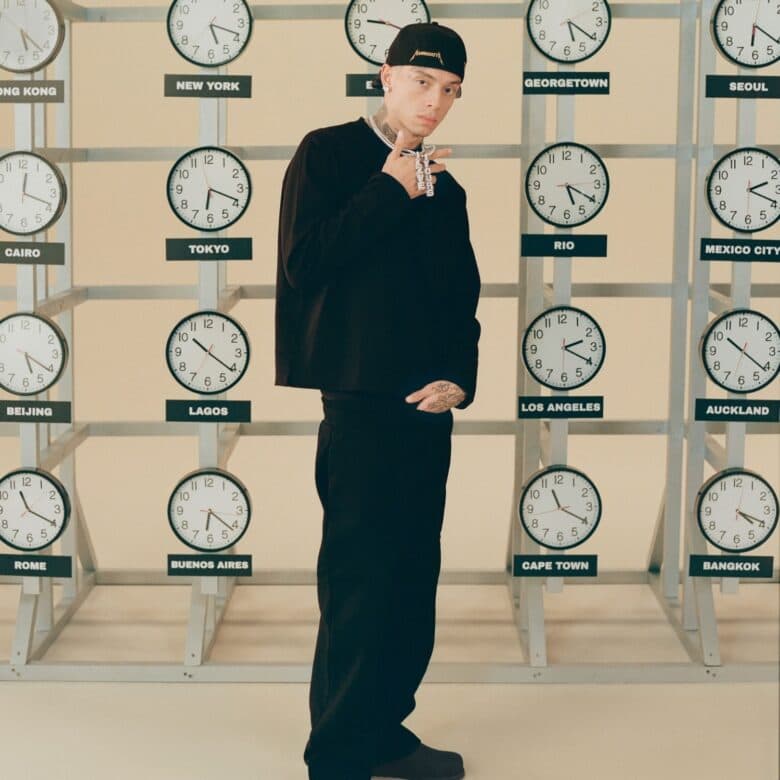Jessie Reyez is done with being the underdog

Reyez picks up my call from her hotel floor in Boston, where she’s stretching her back out in between long haul flights and speaking on a music panel at Berklee College of Music, Massachusetts. I ask her how she’s been feeling since the release of her third studio album last week. Paid in Memories is the first step in a new career path for Reyez, who’s only recently begun releasing music not “associated with being the underdog”. Although her career has now evolved to a level of global stardom, Reyez used to operate behind the scenes, penning songs for artists like Dua Lipa (“One Kiss”), Calvin Harris and Eminem.
“I’ve always had access to a wide range of human emotion, but, with my artistry, I’ve always been conscious of my identity — and became hyperconscious because I became too identified with being the underdog, and too well acquainted with darker songs and darker sounds,” says Reyez. “I always had happier songs, but I had them in a Dropbox folder labelled ‘pitch songs for other artists’, and I’d give those away.”


Now that she’s entered a chapter of healing and becoming more “comfortable with success”, the “FIGURES” singer has decided to take those songs off the pedestal, and put them out for display.
Camille Bavera: Tell me how it feels to be cementing your place in the music industry, not just as a songwriter, but a singer as well.
Jessie Reyez: It feels good, I’m good. The fact that I’m exhausted and happy is a telltale sign that I’m in harmony with the natural flow of what the universe wants for me.
CB: You’ve spoken about not being identified or being boxed in with a specific genre of music, so where do you and this album fit into the industry? Did you just see a Jessie Reyez-shaped hole in music?
JR: That’s funny, because that’s what my exes are looking for — a Jessie Reyez-shaped hole, let’s be honest. But nah, I just wanted to be myself. I always credit my mom and dad, because my mom just always let me be me. If I wanted to dress in curtains, or make shit from bedsheets I was allowed to. And I’m very much reaping the benefits of having developed that thicker skin at a younger age now.
CB: When did you notice that your skin was thicker than other people’s?
JR: It came from just being taught not to allow superficial things to be so heavy. I remember I wanted a specific shoe, an Adidas shoe, and my dad was like, Coucou, come, let’s get these stripes. He got me the four-stripe shoes from Walmart, and I thought they were lit. But then I went to school and everyone was like, Oh they’re Walmart shoes. Being on the receiving end of that teaches you two great lessons early on. One, if something works for you, then fuck everybody else. And two — I guess it encompasses both actually — if something works for you, then, yeah, fuck everybody else. In Canada, Catholic schools are regular, public schools and you’d have to wear a uniform. I remember on our casual day I’d show up with some cut up hoodies and custom jeans I made at home. My friends would be like, Where the fuck did you get that? And I’d made it.


CB: How often did you wind up in the principal’s office?
JR: I was in the principal’s office way more than I should’ve been. It builds character. The funniest shit I ever made was because I was sick of wearing those white, collared shirts, and I hated bras early on. So I cut off the collar of the most ghetto shirts, and then used that fake little collar on the sweater with no shirt underneath. They tried to catch me once, and I was like, You want titties out in the hallway? All I have is a collar and a sweater with no bra. My friends got a kick out of it.
CB: That time in your life was just after the photo was taken for your eighth grade yearbook, which is now the cover of your new album, Paid in Memories. Tell me what it means to be paid in memories.
JR: I’m paid in memories because, despite the heartbreaks, there’s been a lot of beautiful love stories. And how do I pay someone in memories? I try to give them my presence in the most potent form, and be with them in the now. Fuck the past, fuck the future, fuck my phone. Whatever space we’re sharing in the moment, I try to just really be present.
CB: I once heard you say you make music freely, and then look back retrospectively and connect the dots to see how things fit. Does that practice also manifest in your personal life and your relationships?
JR: Totally. Self-analysis is a beautiful thing. I journal as well, which is kind of the same thing. I do it every day, and I’ve done it for a long time now. I found out the hack is having an accountability buddy. You need a friend who’s not a yapper, and is just down to do it. But sometimes it can be a violent slap in the face because you can see things you didn’t see in the moment. Or it can be heart-wrenching because you see something about someone else that you didn’t see before. It’s an interesting little portal when you look back at memories because nostalgia is a scheming, manipulative little bitch. When you journal you have more of a dependable account of what happened and actually do proper self-analysis. There’s less of a nostalgia-washed, rose-coloured-glasses depiction of what it was.


CB: Do you get nostalgic?
JR: I feel like everyone does.
CB: For one time in particular?
JR: Sure. Moments of my childhood just being in the forest with my family, camping by the riverside. One of my homeboys passed away when I was twenty-one, so I have a lot of beautiful memories of riding bikes with him.
CB: As a relatively young artist, and someone who’s still growing and coming into their own in the public eye, what’s your relationship with privacy?
JR: My songs have always been the window into my life. I’m not really public with other stuff, but with my music I’m very, very open. Some people need more windows in their house to feel connected to the outside world, but I’ve been able to just maintain a peephole. And the reason that the peephole is valid is because it’s directly into my heart.
CB: What kind of music was playing in your house as a child?
JR: My introduction to music was Latin music because of my family, so I think, probably, the first that I heard was Cumbia. Then salsa, merengue and slowly my palette grew. Then came reggae — I fell in love. Then hiphop — and I fell in love. Then came soul — and I fell in love. It’s been a progression of recklessly adding shit to my plate of food that I want to eat at the music buffet. It’s just a full plate of shit from everywhere, and I eat all of it.
CB: Is there anything you haven’t eaten from the buffet that you want to try?
JR: I find the scales in Arabic music șo interesting. They’re so foreign that I’d love to just dive into them and study something completely different in terms of vocal agility.


CB: How do you let down your walls to collaborate openly with other artists?
JR: It’s difficult to be intimate with strangers, period. The second there’s fear in the room, it’s just impossible to be as vulnerable as you can be. When I’m writing for myself I’ll just kick people out, I don’t give a fuck. But if I’m writing for someone else, then I’ll bend because I know I’m coming into that room as an assistant and not as the leader, you know? One of my tricks to accelerate intimacy if it’s the first time working with someone, I’ll ask a few questions. But the main question I’ll always use is, When was the last time you cried? Because it’s a shortcut.
CB: When was the last time you cried?
JR: When was the last time I cried…?
Jermi Thomas: The last time you cried was when you were overwhelmed with gratitude from all the love the fans were showing you at the Chicago show the other day.
JR: Chicago fucking got me in my feels. The show was great, the people were great, but it was also twofold because I’m a graduate from this programme called the Remix Project that’s a youth program in Toronto for kids who don’t have access to a studio or mentorship. They have a sister programme in Chicago and, by way of that sister programme, I met my mentor, King Louie, a rapper from Chicago. He changed my life. Chicago was one of the first places to fuck with me, and, mainly, that was because of him. I’m very aware of how lucky I am to still be doing this and to have the team I have — the people I have that’ve been writing with me, the people who’ve made memories with me and kept me close. It’s a fucking gift, and so I just started weeping.
- PhotographerMark Cant
- Fashion and Beauty DirectorMarco Antonio using CHANEL Beauty
- WriterCamille Bavera
- Hair StylistCraig Marsden using BALMAIN Hair




